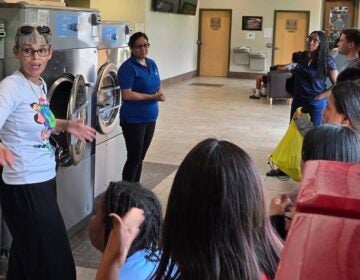Delaware receives federal dollars to improve food stamp program

(USDA Facebook photo)
Delaware is one of seven states to receive thousands of federal dollars to improve its food stamp program.
The First State has been awarded a $667,618 three-year grant from the U.S. Department of Agriculture. The grant is part of an effort to improve the quality and efficiency of serving clients in the Supplement Nutrition Assistance Program (SNAP) nationwide.
The Delaware Department of Health and Social Services will use the funds to design, develop and implement a triage solution at its local SNAP offices.
“We’re going to be able to triage clients to come in and apply for SNAP benefits, particularly expedited services,” said Ray Fitzgerald, division director for the Division of Social Services. “So we can determine clients eligible for expedited eligible food stamps and move them through the lobby, get them seen and determine their eligibility much quicker.”
The department applied for the grant after it conducted a survey last year that found clients were dissatisfied with long waiting times at offices. Fitzgerald said currently, the average wait time can be anywhere from 15 minutes to an hour.
He said since 2008, the caseload for food stamps has nearly doubled in size. Medicaid caseloads have also increased by about 40 or 50 percent, Fitzgerald said. Currently, about 147,000 Delawareans receive monthly food benefits through SNAP.
Fitzgerald said the increased demand for services, the time spent with each client and the enrollment process overall contributes to the excessive wait times.
“Checks come out at the beginning of the month, and people apply for benefits at the beginning of the month. And at the end of the month, people whose cases have been closed are coming in to reopen their benefits,” he said. “So it’s not just an issue of not enough staff or too many clients, it’s the natural churn of how our work is laid out, it also creates some bottleneck. So anything we can do to reduce the bottleneck is better for our staff and definitely better for our clients.”
Over the next three years, the department plans to utilize a triage specialist for all 18 offices to welcome clients and execute triage on the purpose of their visit. The specialists will be equipped with a tablet device with camera and wireless capabilities, allowing them to view case status information. They will also be able to photograph documentation, which will be directly uploaded into the system.
The Division is not hiring additional staff, but repurposing current employees. Fitzgerald said the division hopes clients will wait less than 15 minutes once the triage specialists are applied.
The way it is now, when clients enter the buildings they first wait in line at the front desk. If the desk worker can’t meet their needs on the spot, the client takes a number, takes a seat and waits for a worker to be available.
When the triage specialists begin work, they’ll be able to engage a certain percentage of clients at the door, who may not even need to visit the front desk, making staff readily available to more clients who need more in-depth services.
The specialist will print out a document listing the programs the client is potentially eligible for, and what supporting documents they need to provide.
“It’s always our goal to make sure we’re meeting the needs of our clients,” Fitgerald said. “I think we do a good job providing the services and benefits they need, but I think what this will do is help us gain some trust with the clients. Because the quicker we can service them and meet their needs when they’re in the office and respect their time, their experience will be better and interactions will be quicker and more efficient.”
WHYY is your source for fact-based, in-depth journalism and information. As a nonprofit organization, we rely on financial support from readers like you. Please give today.





